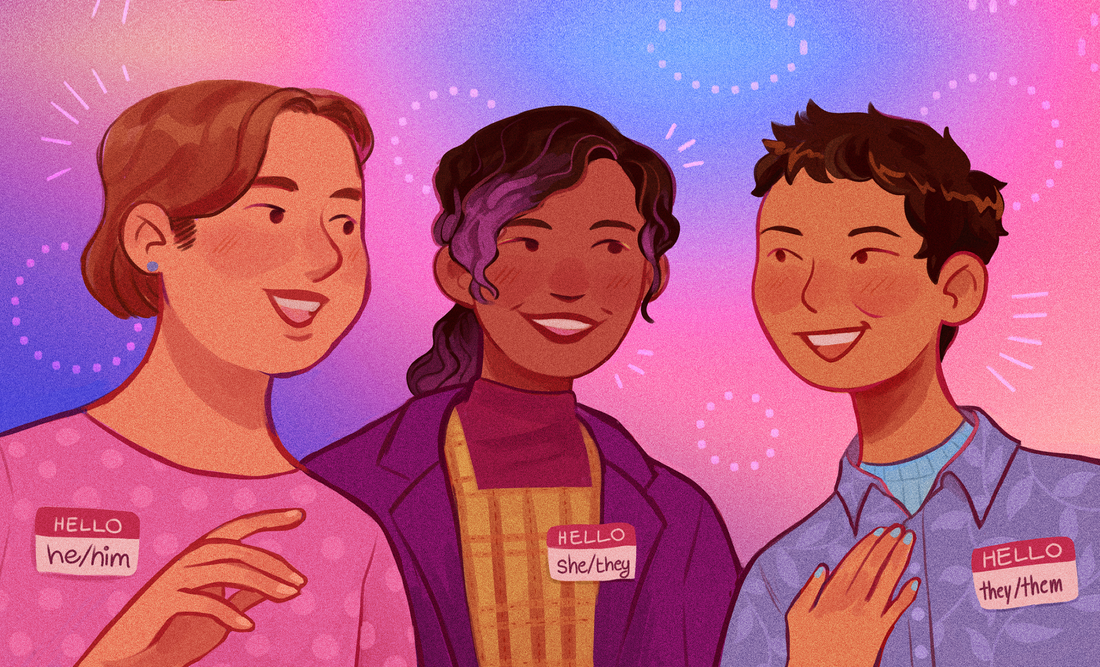
10 Tips for Being a Better Trans and Non-Binary Ally
While rights and acceptance for trans and non-binary people do seem to be improving in many ways, we still have a long way to go before all trans and non-binary people can live their truth safely. Whilst this list is definitely not exhaustive, these 10 tips are designed to help cis people (i.e. people whose gender identity is the same as the gender they were assigned at birth) support trans and non-binary people, and to work to make the world safer and kinder for everyone.
In saying that, everyone is different, and everyone’s experience of their gender is different; just because something works for one person doesn’t mean it will work for someone else. Being respectful of, and listening closely to, the trans and non-binary people in your life will always be the best way to offer the kind of support and allyship that is most appropriate.
Before we jump into the tips – language can be complicated and fluid (a little bit like gender!). In this article, the following terms and definitions are used:
- Trans, i.e. transgender, refers to anyone whose gender identity differs from the gender they were assigned at birth.
- Non-binary is an umbrella term that refers to gender identities that sit outside of the binary genders of man/woman. Some non-binary people also identify as trans (i.e. trans non-binary) while others identify solely as non-binary.
Remember, if you’re a cis person, it’s important to be aware of the privilege you may hold. Situations that may seem straightforward to you (such as getting a drivers licence or going to the doctor) can be difficult, and at times traumatic, for gender diverse people. Whilst some of these tips may seem obvious, think about the situations you may find yourself in where following these tips could make a big difference in ensuring trans and non-binary people feel safe.

1. Don't Assume
Contrary to popular belief, you can’t tell a person’s gender just by looking at them. Avoid making assumptions about the gender someone was assigned at birth, what pronouns a person uses, whether someone is trans, or what someone’s gender might be based on what they are wearing. Whilst it’s pretty safe to assume that you will interact with trans and non-binary people throughout your life, don’t try to assume who is or isn’t trans or non-binary; if they want you to know, they will tell you. What’s more, don’t assume a person’s sexual identity based on their gender identity, and don’t assume that someone is “out” to everyone just because they may be out to you. The last thing you want is to make someone uncomfortable or (worse) to put them in an unsafe situation simply because you assumed to know more than you actually did.
2. Get Educated
There are so many ways to educate yourself to be a better trans and non-binary ally. Documentaries such as Disclosure shine light on trans representation in the media. Gender Minorities Aotearoa, a support service for gender-diverse people, includes a helpful glossary and info about being an ally, alongside important information for health services and other information targeted directly at gender-diverse people. Films such as Rūrangi and He Takatāpui Ahau tell important stories of trans and non-binary people right here in Aotearoa. Finally, Google is forever a haven of information and there is so much information online about being trans and non-binary – if you’re not sure about what something means, a simple Google search will likely help you to find the information you’re after.
3. Use Gender-Neutral Language
We’re long past the “Ladies and Gentlemen, Boys and Girls” vibes. Gender-neutral language is the best way to be inclusive of everyone you’re talking to, no matter what their gender identity may be. Examples of using gender-neutral language can include using pronouns such as “they/them” if you’re not sure of someone’s pronouns, and using language such as “spouse/partner” rather than “husband/wife” or “parent” rather than “mother/father”. When addressing a group, a simple “Hello everyone” or “Kia ora koutou” are neutral ways to be inclusive. It can help to think about the occasions where you might find yourself using gendered language, and to practise using gender-neutral alternatives that work for you and your usual way of speaking.
4. Assess Safety
Whilst you might want to show your support of trans and non-binary people by sharing your own pronouns and encouraging others to do the same, it is not always safe for people to do so. Always check your own privilege and assess whether the situation you’re in is safe for people who may experience the world differently from you. Whilst we might hope for a world where everyone can live loudly and proudly, the reality is that we’re not quite there yet, and a good ally will never push someone into a situation where they do not feel safe.
5. Don’t Ask Intrusive Questions
This one is simple. Don’t ask what someone’s “real name” or “dead name” is. Don’t ask about transitions or medical procedures, and absolutely do not ask about genitals. If someone wants you to know something about their identity or experience, they will tell you.
6. Challenge Transphobia
Once you start noticing, you may be surprised by how much casual transphobia exists in our society. Whether it’s your co-worker making an anti-trans joke, a relative claiming that they/them pronouns are too difficult, or your radical feminist friend freaking out about bathrooms, you’re bound to find yourself confronted with transphobia at some point in time. Wherever possible, push back against dangerous beliefs – whilst a joke might seem reasonably harmless in an office setting, you never know who is listening, and transphobic ideas can spill over into settings that become more dangerous for trans and non-binary people.
7. Listen
If you were going to remember only one of these tips, then this is the one to remember. Listen to the trans and non-binary people in your life, whether they’re your friends, colleagues, relatives or strangers on the Internet who fill up your social media feeds. Use the language that they prefer – whilst trans and non-binary is being used in this article, many people may prefer terms such as takatāpui, gender-fluid or gender-queer. Listen to the pronouns a person uses, or that the people close to them use for them, and follow suit. Listen humbly if a trans or non-binary person points out a mistake you’ve made or a gap in your knowledge, and put in the work to rectify it. Perhaps most importantly, listen to trans and non-binary people when they tell you about their experiences, and believe them.
8. Get Political
You don’t have to join a protest and march in the street if that’s not your vibe (although strong allies at protests would always be welcome!). Signing petitions, learning about gender-based rights, voting for pro-trans and pro-non-binary parties or laws, and speaking out against gender inequality are all ways that you can be a strong political ally.
9. Be Supportive in the Ways That You Can
It’s important to know your limits when it comes to being an ally. Whilst some people have capacity to throw themselves into a cause, argue with transphobic co-workers and challenge the out-dated views of their relatives, others may not be able to bring that same level of energy – and that’s okay. Being an active ally could include following trans and non-binary influencers on social media and liking/sharing their posts, buying from trans/non-binary businesses, reading books by trans and non-binary authors, listening to music by trans and non-binary artists… the list of big and small ways to show your support is endless. Work out what it is you can personally do to be the best ally you can be, and do that with the highest level of energy you can manage.
10. Be Patient
Like anything, gender identity can be a journey, and people won’t have it figured out straight away. Be patient with people in your life as they try on different names, pronouns, clothes and identities; it might take years before they find the right fit. Moreover, be patient with yourself – being a strong ally is a journey of its own, and you won’t get it right straight away. Language is constantly evolving, new issues will be brought into the limelight and there will always be something new to learn. You can’t be expected to know everything or to get everything right straight away. Rather than beating yourself up if you make a mistake or find yourself lacking some key knowledge, use it as an opportunity to do better next time. Remember – the most important thing is that you are openly and actively supportive of the gender diverse people in your life.
If you or someone you know would like support around gender identity, the following organisations are available:
OUTLine NZ – 0800 688 5463 (OUTLINE) provides confidential telephone support.
Rainbow Youth: (09) 376 4155
Words by Shardae Grenfell, AWWA Guest Blogger

